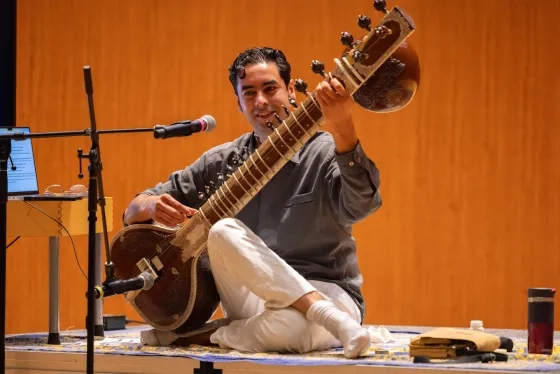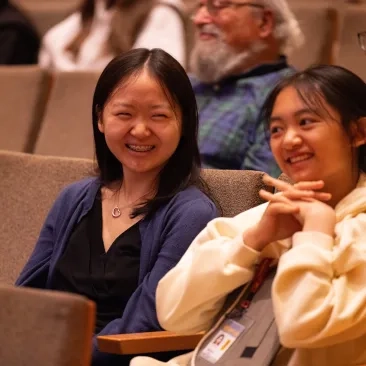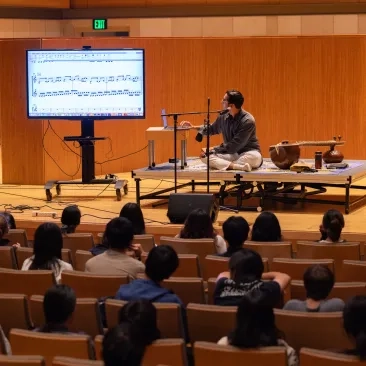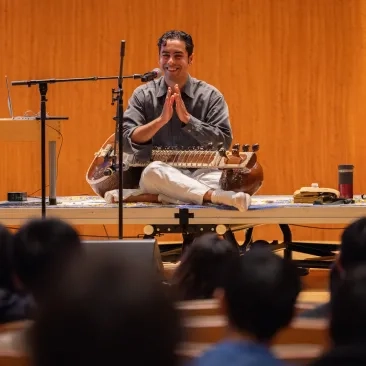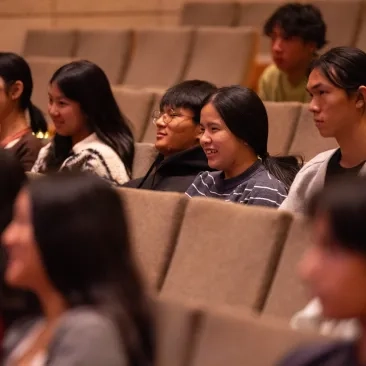Sitarist Holds Pre-College Workshop on Indian Music
Arjun K. Verma teaches at famed Indian musician Ali Akbar’s U.S. school, now located in San Rafael.
Students in SFCM’s Pre-College were treated to an October workshop by Bay Area sitarist Arjun K. Verma, whose teaching lineage can be traced to Ali Akbar Khan, arguably the most famous Indian musician in the States other than Ravi Shankar.
Verma has been an active performer throughout the Bay Area for over two decades. He actually premiered a piece, Bach in Bengal, at the Conservatory, which started his relationship with the school, which has expanded to multiple return visits to expose students to the world of Indian classical music.
“It was so inviting here, and I felt like it was a very much a right place, right time kind of thing because as I started talking with the faculty, they shared with me that SFCM was interested in offering non-European based music,” Verma says.
“My father was a guitarist who learned with Maestro Ali Akbar Khan,” Verma says. “So I had learned with my father since I was a little boy, and toured with him since I was about 7. I met Maestro Ali when I was about 8 on a brief visit, but it wasn’t until I was about 15 that my family came out here. I got my mind blown sitting in classes with him: It's like getting to sit down with Mozart; that level of genius where you can really see it's unfathomable.”
Exposing musicians who have exclusively been trained in Western styles can be a bit of a challenge, since most Indian classical music training is strictly oral and aural, with very little notated. “It's a really big question how to present this genre to people,” Verma says. “If someone had never heard jazz, how do you pick one piece to explain it? And jazz is only about a century and a half old, tops. Indian classical’s direct line goes back 500 years and that's just our modern period.”
Verma tries to contextualize the sounds of Indian music to new listeners by relating the microtones and complicated rhythms to more familiar Western concepts. For younger students, this breaks down as simply as counting: The basic rhythm structure of Indian classical music is called Konnakol, in which rhythmic units are verbalized with syllables like “ta,” “ka,” “di” and “mi.” Once a newcomer grasps that, it’s easier to grasp the complex cells of rhythms that make up Indian classical.
Verma now teaches at the Ali Akbar Khan College of Music, which was founded originally in 1967 in Berkeley by Khan. It’s since moved to San Rafael, and Verma hopes to expand his relationship with SFCM to the College as well.
“We at the College side are very excited to engage with SFCM students in a really bilateral kind of way. We want to build bridges, rather than just offering Indian classical for its own sake. Even learning a little bit about our tradition can strengthen musicianship for musicians of all genres, and I’m living proof that that exchange can go both ways as well.”
Learn more about SFCM's Pre-College program here.
